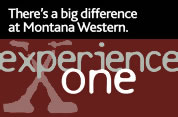 |
Honors Program Course Description |
|
Honors Program: A pathway to excellence. HONR 101A/301A Geology, Mining, Culture, & Labor History of Butte, Montana (Roberts & Satterley) Butte, Montana (and immediate vicinity) has a very long geological history, which ultimately resulted in metals mineralization that earned it the name “Richest Hill on Earth.” Early Native Americans apparently exploited some of the near-surface mineralization, but it was the increasingly important sequence of gold-silver-copper discoveries in the mid to late 19th Century that created the mining community of Butte. Mining attracted people from all over the world, who carried out a wild, rich, multicultural experiment in the middle of the otherwise rural West, and completely altered the history of Montana, the labor movement, and the landscape. Mining continues today, as does the cleanup of the nation’s largest Superfund site. Join this Honors class to explore the geology and history of Butte with field trips, archives research, guest lecturers, films, food, stories, and more. The course will explore Butte geology and human and environmental history, in an experiential format that will include relevant lectures but will center on:
Instructors: Dr. Sheila Roberts and Thomas Satterly Substitutions: Possible course substitutions (subject to departmental approval): Geology 101 (Introduction to Geology); Geology 103 (Introduction to Environmental Geology); Geology 409 (Geology Seminar); History 294 (History Seminar, a General Education history course); History 355 (Montana and the American West); Time: Spring 2015, Block 7 |
 << back
next>>
<< back
next>>
|
|---|
